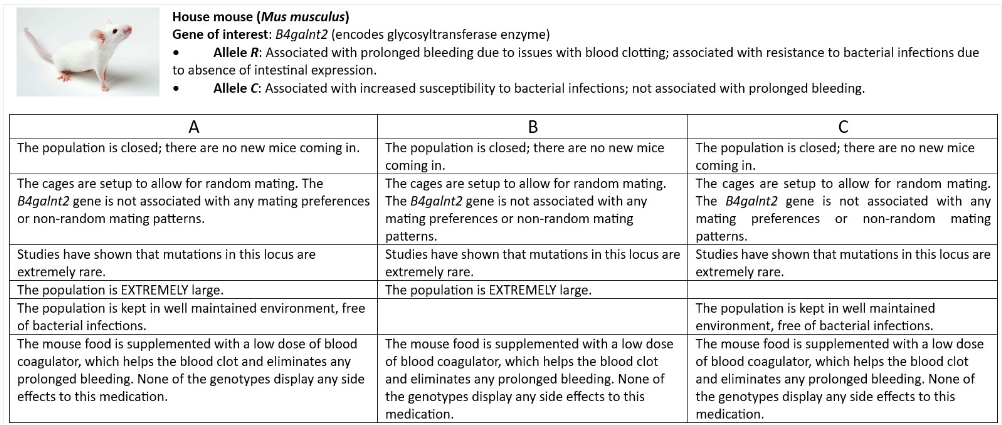Given the conditions in column B, predict what will happen to the frequency of the R allele over the years (increase, decrease, or remain the same) if the outbreak is not contained?
Given the conditions in column B, predict what will happen to the frequency of the R allele over the years (increase, decrease, or remain the same) if the outbreak is not contained?
Biology Today and Tomorrow without Physiology (MindTap Course List)
5th Edition
ISBN:9781305117396
Author:Cecie Starr, Christine Evers, Lisa Starr
Publisher:Cecie Starr, Christine Evers, Lisa Starr
Chapter9: Patterns Of Inheritance
Section: Chapter Questions
Problem 2DID
Related questions
Topic Video
Question
Despite their excellent hygienic practices, the Kelatavicla lab experiences a devastating bacterial infection in their mouse population in 2012. Given the conditions in column B, predict what will happen to the frequency of the R allele over the years (increase, decrease, or remain the same) if the outbreak is not contained?

Transcribed Image Text:House mouse (Mus musculus)
Gene of interest: B4galnt2 (encodes glycosyltransferase enzyme)
Allele R: Associated with prolonged bleeding due to issues with blood clotting; associated with resistance to bacterial infections due
to absence of intestinal expression.
Allele C: Associated with increased susceptibility to bacterial infections; not associated with prolonged bleeding.
A
B
с
The population is closed; there are no new mice coming in.
The cages are setup to allow for random mating. The
B4galnt2 gene is not associated with any mating preferences
or non-random mating patterns.
Studies have shown that mutations in this locus are
extremely rare.
The population is EXTREMELY large.
The population is kept in well maintained environment, free
of bacterial infections.
The mouse food is supplemented with a low dose of blood
coagulator, which helps the blood clot and eliminates any
prolonged bleeding. None of the genotypes display any side
effects to this medication.
The population is closed; there are no new mice
coming in.
The cages are setup to allow for random mating.
The B4galnt2 gene is not associated with any
mating preferences or non-random mating
patterns.
The population is closed; there are no new mice
coming in.
The cages are setup to allow for random mating.
The B4galnt2 gene is not associated with any
mating preferences or non-random mating
patterns.
Studies have shown that mutations in this locus are Studies have shown that mutations in this locus are
extremely rare.
The population is EXTREMELY large.
The mouse food is supplemented with a low dose
of blood coagulator, which helps the blood clot
and eliminates any prolonged bleeding. None of
the genotypes display any side effects to this
medication.
extremely rare.
The population is kept in well maintained
environment, free of bacterial infections.
The mouse food is supplemented with a low dose
of blood coagulator, which helps the blood clot
and eliminates any prolonged bleeding. None of
the genotypes display any side effects to this
medication.
Expert Solution
This question has been solved!
Explore an expertly crafted, step-by-step solution for a thorough understanding of key concepts.
Step by step
Solved in 4 steps

Knowledge Booster
Learn more about
Need a deep-dive on the concept behind this application? Look no further. Learn more about this topic, biology and related others by exploring similar questions and additional content below.Recommended textbooks for you

Biology Today and Tomorrow without Physiology (Mi…
Biology
ISBN:
9781305117396
Author:
Cecie Starr, Christine Evers, Lisa Starr
Publisher:
Cengage Learning

Human Heredity: Principles and Issues (MindTap Co…
Biology
ISBN:
9781305251052
Author:
Michael Cummings
Publisher:
Cengage Learning

Biology Today and Tomorrow without Physiology (Mi…
Biology
ISBN:
9781305117396
Author:
Cecie Starr, Christine Evers, Lisa Starr
Publisher:
Cengage Learning

Human Heredity: Principles and Issues (MindTap Co…
Biology
ISBN:
9781305251052
Author:
Michael Cummings
Publisher:
Cengage Learning